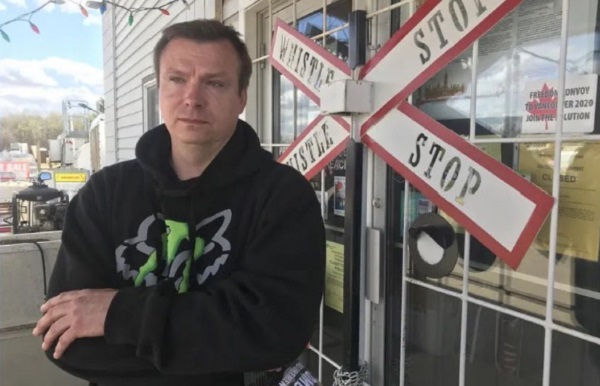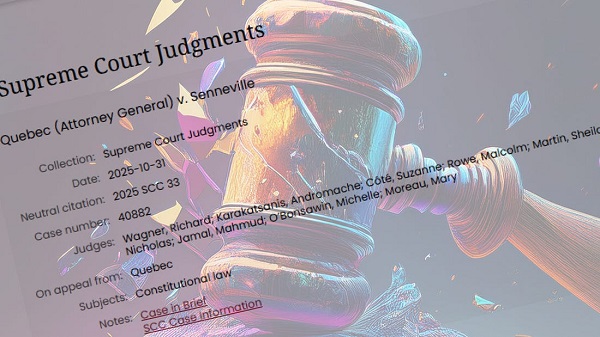Alberta
Chris Scott and Rebecca Ingram attempting Class Action Lawsuit against Province for COVID restrictions

From Rath & Company
Business Class Action Update – October 1, 2021
The Certification Hearing scheduled with Justice Feasby will be available for online viewing. Below are the details you need to join the session:
Date and Time:
- October 2 and 3, 2024, at 10:00 AM (Mountain Time, UTC-06:00)
Join Online:
- Webex Link: https://albertacourts.webex.com/meet/virtual.courtroom16
- Webinar Number: 265 095 912
- Video address: [email protected]
- Webinar Password: COURT10022024 (or use the numeric code 26878100 when dialing in)
Join by Phone:
- Dial-In Number: +1-780-851-3573 (Canada Toll – Edmonton)
- Access Code: 277 254 26969
PLEASE NOTE – Recording or rebroadcasting of this hearing is strictly prohibited.
Documents related to this matter that have been filed to date are available for viewing online – see links BELOW.
We encourage all interested parties to observe the proceedings.
Alberta
Alberta government’s plan will improve access to MRIs and CT scans

From the Fraser Institute
By Nadeem Esmail and Tegan Hill
The Smith government may soon allow Albertans to privately purchase diagnostic screening and testing services, prompting familiar cries from defenders of the status quo. But in reality, this change, which the government plans to propose in the legislature in the coming months, would simply give Albertans an option already available to patients in every other developed country with universal health care.
It’s important for Albertans and indeed all Canadians to understand the unique nature of our health-care system. In every one of the 30 other developed countries with universal health care, patients are free to seek care on their own terms with their own resources when the universal system is unwilling or unable to satisfy their needs. Whether to access care with shorter wait times and a more rapid return to full health, to access more personalized services or meet a personal health need, or to access new advances in medical technology. But not in Canada.
That prohibition has not served Albertans well. Despite being one of the highest-spending provinces in one of the most expensive universal health-care systems in the developed world, Albertans endure some of the longest wait times for health care and some of the worst availability of advanced diagnostic and medical technologies including MRI machines and CT scanners.
Introducing new medical technologies is a costly endeavour, which requires money and the actual equipment, but also the proficiency, knowledge and expertise to use it properly. By allowing Albertans to privately purchase diagnostic screening and testing services, the Smith government would encourage private providers to make these technologies available and develop the requisite knowledge.
Obviously, these new providers would improve access to these services for all Alberta patients—first for those willing to pay for them, and then for patients in the public system. In other words, adding providers to the health-care system expands the supply of these services, which will reduce wait times for everyone, not just those using private clinics. And relief can’t come soon enough. In Alberta, in 2024 the median wait time for a CT scan was 12 weeks and 24 weeks for an MRI.
Greater access and shorter wait times will also benefit Albertans concerned about their future health or preventative care. When these Albertans can quickly access a private provider, their appointments may lead to the early discovery of medical problems. Early detection can improve health outcomes and reduce the amount of public health-care resources these Albertans may ultimately use in the future. And that means more resources available for all other patients, to the benefit of all Albertans including those unable to access the private option.
Opponents of this approach argue that it’s a move towards two-tier health care, which will drain resources from the public system, or that this is “American-style” health care. But these arguments ignore that private alternatives benefit all patients in universal health-care systems in the rest of the developed world. For example, Switzerland, Germany, the Netherlands and Australia all have higher-performing universal systems that provide more timely care because of—not despite—the private options available to patients.
In reality, the Smith government’s plan to allow Albertans to privately purchase diagnostic screening and testing services is a small step in the right direction to reduce wait times and improve health-care access in the province. In fact, the proposal doesn’t go far enough—the government should allow Albertans to purchase physician appointments and surgeries privately, too. Hopefully the Smith government continues to reform the province’s health-care system, despite ill-informed objections, with all patients in mind.
Alberta
Canada’s heavy oil finds new fans as global demand rises

From the Canadian Energy Centre
By Will Gibson
“The refining industry wants heavy oil. We are actually in a shortage of heavy oil globally right now, and you can see that in the prices”
Once priced at a steep discount to its lighter, sweeter counterparts, Canadian oil has earned growing admiration—and market share—among new customers in Asia.
Canada’s oil exports are primarily “heavy” oil from the Alberta oil sands, compared to oil from more conventional “light” plays like the Permian Basin in the U.S.
One way to think of it is that heavy oil is thick and does not flow easily, while light oil is thin and flows freely, like fudge compared to apple juice.
“The refining industry wants heavy oil. We are actually in a shortage of heavy oil globally right now, and you can see that in the prices,” said Susan Bell, senior vice-president of downstream research with Rystad Energy.
A narrowing price gap
Alberta’s heavy oil producers generally receive a lower price than light oil producers, partly a result of different crude quality but mainly because of the cost of transportation, according to S&P Global.
The “differential” between Western Canadian Select (WCS) and West Texas Intermediate (WTI) blew out to nearly US$50 per barrel in 2018 because of pipeline bottlenecks, forcing Alberta to step in and cut production.
So far this year, the differential has narrowed to as little as US$10 per barrel, averaging around US$12, according to GLJ Petroleum Consultants.
“The differential between WCS and WTI is the narrowest I’ve seen in three decades working in the industry,” Bell said.
Trans Mountain Expansion opens the door to Asia

Oil tanker docked at the Westridge Marine Terminal in Burnaby, B.C. Photo courtesy Trans Mountain Corporation
The price boost is thanks to the Trans Mountain expansion, which opened a new gateway to Asia in May 2024 by nearly tripling the pipeline’s capacity.
This helps fill the supply void left by other major regions that export heavy oil – Venezuela and Mexico – where production is declining or unsteady.
Canadian oil exports outside the United States reached a record 525,000 barrels per day in July 2025, the latest month of data available from the Canada Energy Regulator.
China leads Asian buyers since the expansion went into service, along with Japan, Brunei and Singapore, Bloomberg reports. 
Asian refineries see opportunity in heavy oil
“What we are seeing now is a lot of refineries in the Asian market have been exposed long enough to WCS and now are comfortable with taking on regular shipments,” Bell said.
Kevin Birn, chief analyst for Canadian oil markets at S&P Global, said rising demand for heavier crude in Asia comes from refineries expanding capacity to process it and capture more value from lower-cost feedstocks.
“They’ve invested in capital improvements on the front end to convert heavier oils into more valuable refined products,” said Birn, who also heads S&P’s Center of Emissions Excellence.
Refiners in the U.S. Gulf Coast and Midwest made similar investments over the past 40 years to capitalize on supply from Latin America and the oil sands, he said.
While oil sands output has grown, supplies from Latin America have declined.
Mexico’s state oil company, Pemex, reports it produced roughly 1.6 million barrels per day in the second quarter of 2025, a steep drop from 2.3 million in 2015 and 2.6 million in 2010.
Meanwhile, Venezuela’s oil production, which was nearly 2.9 million barrels per day in 2010, was just 965,000 barrels per day this September, according to OPEC.
The case for more Canadian pipelines

Worker at an oil sands SAGD processing facility in northern Alberta. Photo courtesy Strathcona Resources
“The growth in heavy demand, and decline of other sources of heavy supply has contributed to a tighter market for heavy oil and narrower spreads,” Birn said.
Even the International Energy Agency, known for its bearish projections of future oil demand, sees rising global use of extra-heavy oil through 2050.
The chief impediments to Canada building new pipelines to meet the demand are political rather than market-based, said both Bell and Birn.
“There is absolutely a business case for a second pipeline to tidewater,” Bell said.
“The challenge is other hurdles limiting the growth in the industry, including legislation such as the tanker ban or the oil and gas emissions cap.”
A strategic choice for Canada
Because Alberta’s oil sands will continue a steady, reliable and low-cost supply of heavy oil into the future, Birn said policymakers and Canadians have options.
“Canada needs to ask itself whether to continue to expand pipeline capacity south to the United States or to access global markets itself, which would bring more competition for its products.”
-

 Crime2 days ago
Crime2 days agoPublic Execution of Anti-Cartel Mayor in Michoacán Prompts U.S. Offer to Intervene Against Cartels
-

 Business1 day ago
Business1 day agoCarney government should retire misleading ‘G7’ talking point on economic growth
-

 Alberta1 day ago
Alberta1 day agoCanada’s heavy oil finds new fans as global demand rises
-

 Censorship Industrial Complex1 day ago
Censorship Industrial Complex1 day agoPro-freedom group warns Liberal bill could secretly cut off Canadians’ internet access
-

 Aristotle Foundation2 days ago
Aristotle Foundation2 days agoB.C. government laid groundwork for turning private property into Aboriginal land
-

 Brownstone Institute18 hours ago
Brownstone Institute18 hours agoBizarre Decisions about Nicotine Pouches Lead to the Wrong Products on Shelves
-

 Justice2 days ago
Justice2 days agoA Justice System That Hates Punishment Can’t Protect the Innocent
-

 Bruce Dowbiggin1 day ago
Bruce Dowbiggin1 day agoA Story So Good Not Even The Elbows Up Crew Could Ruin It









